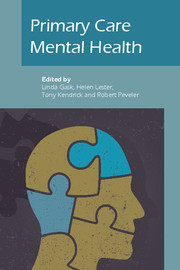Book contents
- Frontmatter
- Contents
- List of figures, tables and boxes
- List of contributors
- Preface
- Part I Conceptual basis and overarching themes
- Part II Clinical issues
- 8 Depression
- 9 Suicide and self-harm
- 10 Anxiety
- 11 Medically unexplained symptoms
- 12 Mental health problems in older people
- 13 Perinatal mental health
- 14 Child and adolescent mental health
- 15 Psychosis
- 16 Emergencies in primary care
- 17 Substance misuse
- 18 Management of alcohol problems
- 19 Eating disorders
- 20 Physical health of people with mental illness
- 21 Ethnic minorities
- 22 Asylum seekers and refugees
- 23 Sexual problems
- Part III Policy and practice
- Part IV Reflective practice
- Epilogue: Racing pigeons and rolling rocks: reflections on complex problems in primary care
- Index
13 - Perinatal mental health
from Part II - Clinical issues
Published online by Cambridge University Press: 02 January 2018
- Frontmatter
- Contents
- List of figures, tables and boxes
- List of contributors
- Preface
- Part I Conceptual basis and overarching themes
- Part II Clinical issues
- 8 Depression
- 9 Suicide and self-harm
- 10 Anxiety
- 11 Medically unexplained symptoms
- 12 Mental health problems in older people
- 13 Perinatal mental health
- 14 Child and adolescent mental health
- 15 Psychosis
- 16 Emergencies in primary care
- 17 Substance misuse
- 18 Management of alcohol problems
- 19 Eating disorders
- 20 Physical health of people with mental illness
- 21 Ethnic minorities
- 22 Asylum seekers and refugees
- 23 Sexual problems
- Part III Policy and practice
- Part IV Reflective practice
- Epilogue: Racing pigeons and rolling rocks: reflections on complex problems in primary care
- Index
Summary
The term ‘perinatal mental health’ covers mental health problems that occur in women during pregnancy and the first postnatal year. There has been a great deal written about postnatal depression, the most common postnatal mental health problem, during the past two decades but much less about the mental health problems that occur during pregnancy. It is only recently that research has revealed how prevalent and important these are, particularly in terms of their relationship to postnatal disorders and their subsequent effect on both the mother's and the infant's health and well-being (Evans et al, 2001; O'Connor et al, 2002; O'Keane, 2006).
Although the range of mental health problems occurring at these times is not dissimilar to those affecting all adults, their nature, treatment and effects are different in several ways. For example, stopping psychotropic medication abruptly in a pregnancy owing to concerns about teratogenicity can worsen or precipitate an episode of mental illness. In women with, for example, bipolar illness, the risk of relapse is higher in the immediate postpartum period. When considering the diagnosis and treatment of perinatal mental health problems, there is often more than one patient to consider. An acute psychotic episode after the birth may place the infant as well as the mother at risk. A lengthy postnatal depression may have longterm adverse effects on the child's development and the marital relationship (Cooper & Murray, 1998). The Confidential Enquiry into Maternal and Child Health (2004) reported that, overall, the leading cause of maternal death was suicide, with more than half of the women who died having an underlying history of mental illness. Many of these women had had regular contact with healthcare professionals. The need to prevent, identify as early as possible and treat such potentially life-threatening conditions optimally is clear.
Classification
In the two major systems, the International Classification of Diseases, Tenth Revision (ICD–10; World Health Organization, 1992) and the Diagnostic and Statistical Manual of Mental Disorders, Fourth Edition (DSM–IV; American Psychiatric Association, 1994), perinatal mental disorders have only just been categorised separately, but both require certain qualifications to be met that limit their use: ICD–10 categorises mental disorders that occur postpartum as ‘puerperal’, but only if they cannot otherwise be classified, and DSM–IV allows ‘postpartum onset’ to be specified for mood disorders starting within 4 weeks of delivery.
- Type
- Chapter
- Information
- Primary Care Mental Health , pp. 198 - 210Publisher: Royal College of PsychiatristsPrint publication year: 2009



